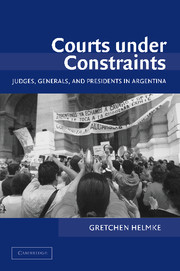Book contents
- Frontmatter
- Contents
- List of Tables
- List of Figures
- Preface and Acknowledgments
- 1 RULING AGAINST THE RULERS
- 2 THE LOGIC OF STRATEGIC DEFECTION
- 3 A THEORY OF COURT-EXECUTIVE RELATIONS: INSECURE TENURE, INCOMPLETE INFORMATION, AND STRATEGIC BEHAVIOR
- 4 JUDGES, GENERALS, AND PRESIDENTS: INSTITUTIONAL INSECURITY ON THE ARGENTINE SUPREME COURT, 1976–1999
- 5 THE REVERSE LEGAL-POLITICAL CYCLE: AN ANALYSIS OF DECISION MAKING ON THE ARGENTINE SUPREME COURT
- 6 THE DYNAMICS OF DEFECTION: HUMAN RIGHTS, CIVIL LIBERTIES, AND PRESIDENTIAL POWER
- 7 CONCLUSION: BROADER LESSONS AND FUTURE DIRECTIONS
- Appendix A Overview of the Federal Argentine Judiciary and the Argentine Supreme Court
- Appendix B The Argentine Supreme Court Decisions Data Set
- Appendix C Equilibria Proofs
- References
- Index
3 - A THEORY OF COURT-EXECUTIVE RELATIONS: INSECURE TENURE, INCOMPLETE INFORMATION, AND STRATEGIC BEHAVIOR
Published online by Cambridge University Press: 24 July 2009
- Frontmatter
- Contents
- List of Tables
- List of Figures
- Preface and Acknowledgments
- 1 RULING AGAINST THE RULERS
- 2 THE LOGIC OF STRATEGIC DEFECTION
- 3 A THEORY OF COURT-EXECUTIVE RELATIONS: INSECURE TENURE, INCOMPLETE INFORMATION, AND STRATEGIC BEHAVIOR
- 4 JUDGES, GENERALS, AND PRESIDENTS: INSTITUTIONAL INSECURITY ON THE ARGENTINE SUPREME COURT, 1976–1999
- 5 THE REVERSE LEGAL-POLITICAL CYCLE: AN ANALYSIS OF DECISION MAKING ON THE ARGENTINE SUPREME COURT
- 6 THE DYNAMICS OF DEFECTION: HUMAN RIGHTS, CIVIL LIBERTIES, AND PRESIDENTIAL POWER
- 7 CONCLUSION: BROADER LESSONS AND FUTURE DIRECTIONS
- Appendix A Overview of the Federal Argentine Judiciary and the Argentine Supreme Court
- Appendix B The Argentine Supreme Court Decisions Data Set
- Appendix C Equilibria Proofs
- References
- Index
Summary
The previous chapter laid the groundwork for identifying strategic defection as a distinct form of judicial behavior. The main intuition was that whenever judges lack institutional insecurity they will face powerful incentives to rule against the current government, once the government begins to lose power. Yet thus far very little has been said about why exactly judges believe that defection would work. Because defection makes sense only if judges believe that it will improve their fates, the next step is, therefore, to develop a unified theoretical framework that links together systematically judges' and politicians' behavior.
While this chapter retains the core insights of the logic of strategic defection, it thus departs from the previous chapter in two fundamental ways. First, rather than simply treat sanctions as an exogenous constraint that judges face, it offers an endogenous account of why politicians punish loyal judges and reward defectors. Second and relatedly, it develops a formal signaling model of court-executive relations that allows us to capture systematically problems of incomplete and imperfect information. Specifically, the model allows us to bring together the intuitions from the previous chapter regarding judges' uncertainty over the incoming government with the idea that politicians may likewise be uncertain about the type of judges that they face. Although the discussion that follows is somewhat more technically demanding than the previous chapter, the result is a deeper understanding of the conditions that lead to strategic defection as well as a more precise understanding of the various factors that may inhibit it.
Information
- Type
- Chapter
- Information
- Courts under ConstraintsJudges, Generals, and Presidents in Argentina, pp. 41 - 60Publisher: Cambridge University PressPrint publication year: 2004
